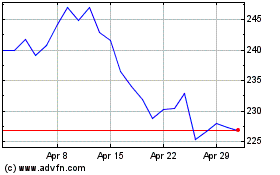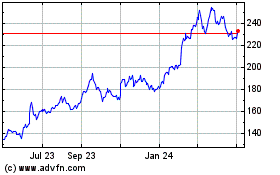Prices, Interest Rates Weigh on Auto Sales -- WSJ
April 03 2019 - 3:02AM
Dow Jones News
By Adrienne Roberts
This article is being republished as part of our daily
reproduction of WSJ.com articles that also appeared in the U.S.
print edition of The Wall Street Journal (April 3, 2019).
Major auto makers on Tuesday posted declines in U.S. sales for
the first quarter, adding pressure on car companies already
grappling with weaker conditions in important markets globally.
Analysts expect the industry to report an overall decline of
around 5% in sales for March, historically one of the biggest
months for car sales as the unofficial start to the spring selling
season. First-quarter sales are expected to decline 3% to 4%
compared with a year earlier, according to analyst estimates.
Several factors are contributing to the slowdown. A record run
of car sales eased pent-up demand in the years following the
2007-09 recession, analysts say. Vehicle prices also have risen
sharply, which, along with an uptick in interest rates, have put
new wheels out of reach for some buyers.
There also are more attractive used-car options as a record
number of lightly used cars return from lease service, nudging more
buyers toward the preowned lot, analysts say.
"We can confidently say new-vehicle sales are past their peak,"
said Jeremy Acevedo, an analyst at car-shopping site Edmunds.com.
"The question now is what the new normal will be."
The first-quarter decline makes it likely that full-year U.S.
sales will fall below 17 million vehicles for the first time since
2014, analysts say.
General Motors Co. , the largest U.S. auto maker by sales, said
Tuesday sales through the first three months of the year dropped
7%. Fiat Chrysler Automobiles NV said sales dropped 3% in the first
quarter.
Toyota Motor Corp. and Nissan Motor Co. both said sales declined
in the quarter. Honda Motor Co. was the only major auto maker to
report a sales increase.
Ford Motor Co. said it would report March sales on Thursday.
"There's an uneasy feeling," said Ernie Boch Jr., a car dealer
with brands such as Toyota, Chevrolet and Nissan near Boston. He
said while sport-utility vehicles and pickup trucks are selling
well and bringing in strong profits, sedan sales are
struggling.
Several auto makers said solid economic indicators like
employment and wage growth should help car sales for the remainder
of the year following a slow start.
Jack Hollis, general manager of Toyota North America, said
relatively low gasoline prices, high consumer confidence and fewer
than expected interest rate increases should bolster new-vehicle
demand.
"Obviously everything changes depending on if there are border
closings, tariffs or anything having to do with trade," Mr. Hollis
told reporters during a conference call. "Assuming those things
don't come to fruition, I think we have a very strong year."
Despite the first-quarter decline, strong pricing in the U.S.
remains a silver lining for the auto industry. Consumers continue
to shell out more money for new vehicles, largely because of a
rapid rotation from traditional sedans into larger, pricier
vehicles like SUVs and pickup trucks, helping to bolster auto
makers' bottom lines.
Detroit's auto makers have been rolling out more SUVs and pickup
trucks to capitalize on the trend. For example, GM said buyers of
its redesigned Chevrolet Silverado and GMC Sierra pickup trucks
shelled out $8,000 more for the new trucks last quarter -- to
around $48,000 -- compared with what they spent on the older
versions a year earlier.
Industrywide, the average price paid by an individual buyer rose
about 3% in the first quarter to $33,319, a record for the period,
according to research firm J.D. Power.
While the pace of U.S. sales remains historically strong, the
U.S. slowdown comes as auto demand weakens in China, the world's
largest car market by sales. China vehicle sales fell last year for
the first time in more than two decades and continued to decline in
the first few months of this year.
BMW AG said last month that global economic and trade pressures,
combined with the rising cost of investments in electric and
self-driving cars, would lead to a significant drop in the auto
maker's profit this year. Daimler AG, Ford and GM all have recently
undertaken large cost-cutting programs as profit margins come under
pressure.
Corrections & Amplifications Honda Motor Co.'s sales rose by
2% in the quarter. An earlier version of this article incorrectly
said sales declined by 2%.
Write to Adrienne Roberts at Adrienne.Roberts@wsj.com
(END) Dow Jones Newswires
April 03, 2019 02:47 ET (06:47 GMT)
Copyright (c) 2019 Dow Jones & Company, Inc.
Toyota Motor (NYSE:TM)
Historical Stock Chart
From Jun 2024 to Jul 2024

Toyota Motor (NYSE:TM)
Historical Stock Chart
From Jul 2023 to Jul 2024
